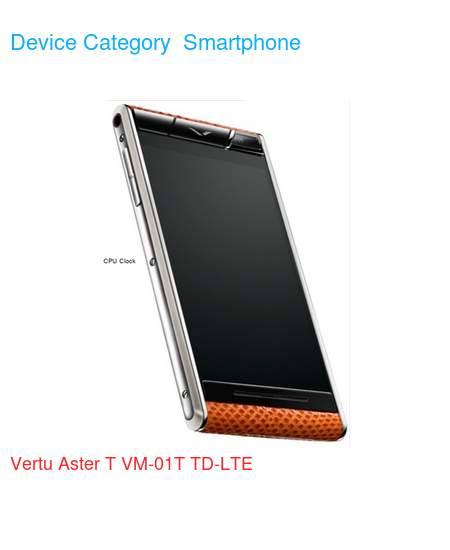| Brand | Vertu |
| Model | Aster T VM-01T TD-LTE |
| Released | 2014 Dec |
| Device Category | Smartphone |
| Width | 69 mm |
| Height | 143.4 mm |
| Depth | 11.1 mm |
| Dimensions | 2.72×5.65×0.44 inches |
| Mass | 193 g |
| Platform | Android |
| Operating System | Google Android 4.4.2 (KitKat) |
| CPU Clock | 2265 MHz |
| CPU | Qualcomm Snapdragon 801 MSM8974AB v3, 2014, 32 bit, quad-core, 16 Kbyte I-Cache, 16 Kbyte D-Cache, 2048 Kbyte L2, 28 nm, Qualcomm Adreno 330 GPU |
| RAM Type | LPDDR3 SDRAM |
| RAM Capacity (converted) | 2 GiB RAM |
| Non-volatile Memory Interface | Yes |
| Non-volatile Memory Capacity (converted) | 64 GB ROM |
| Display Diagonal | 119.4 mm |
| Resolution | 1080×1920 |
| Horizontal Full Bezel Width | 10.46 mm |
| Display Area Utilization | 61.6% |
| Pixel Density | 469 PPI |
| Display Type | Color TN-TFT LCD display |
| Number of Display Scales | 16.8M |
| Scratch Resistant Screen | No |
| Graphical Controller | Qualcomm Adreno 330 |
| Dedicated Graphics Memory | 0.5 MiB |
| A/V Out | No |
| Audio Controller | Bang & Olufsen MS3 |
| Microphone(s) | mono |
| Loudspeaker(s): | stereo |
| Audio Output: | 3.5mm |
| Supported Cellular Bands | GSM850 , GSM900 , GSM1800 , GSM1900 , UMTS2100 (B1) , LTE1900 (B2) , LTE1800 (B3) , LTE1700/2100 (B4) , LTE850 (B5) , LTE900 (B8) , LTE1900 (B25) , TD-LTE2600 (B38) , TD-LTE1900 (B39) , TD-LTE2300 (B40) , TD-LTE2500 (B41) bands |
| Supported Cellular Data Links | GPRS , EDGE , UMTS , HSUPA , HSUPA 5.8 , HSDPA , HSPA+ 21.1 , DC-HSDPA 42.2 , LTE , LTE 150/50 data links |
| SIM Card Slot | Yes |
| Complementary Phone Services | Voice transmission , Voice speaker , Vibrate , Speakerphone |
| Sec. Supported Cellular Networks: | No |
| Touchscreen Type | Capacitive multi-touch screen |
| Expansion Interfaces | No |
| USB | USB 2.0 |
| USB Services | USB charging , USB Host , USB OTG 1.3 , USB PD |
| USB Connector | USB Micro-AB |
| Bluetooth | Bluetooth 4.0 |
| Wireless LAN | 802.11a , 802.11b , 802.11g , 802.11n , 802.11ac |
| Wireless Services | Wi-Fi Direct , Wi-Fi Tethering |
| NFC | Yes |
| IR | Yes |
| FM Radio Receiver | FM radio (76-108 MHz) with RDS |
| Complementary Satellite Services | Simultaneous GPS , A-GPS , Geotagging , QuickGPS |
| Supported GLONASS protocol(s) | L1OF |
| Camera Placement | Rear |
| Camera Image Sensor | CMOS |
| Number of effective pixels | 12.8 MP camera |
| Zoom | 1.0 x optical zoom |
| Focus | CD AF |
| Video Recording | 1920×1080 pixel |
| Flash | dual LED |
| Camera Extra Functions | Macro mode |
| Aux. Camera Image Sensor | No |
| Aux. 2 Camera Image Sensor | No |
| Aux. 3 Camera Image Sensor | No |
| Aux. 4 Camera Image Sensor | No |
| Secondary Camera Placement | Front |
| Secondary Camera Sensor | CMOS |
| Secondary Camera Number of pixels | 2.1 MP sec. cam |
| Secondary Video Recording | 1920×1080 pixel |
| Sec. Aux. Cam. Image Sensor | No |
| Built-in compass | Yes |
| Built-in accelerometer | Yes |
| Built-in gyroscope | Yes |
| Additional sensors | L sensor , P sensor |
| Protection from solid materials | Yes |
| Protection from liquids | Yes |
| Battery | Li-ion |
| Nominal Battery Capacity | 2275 mAh battery |
| Added | 2024-07-06 |
Specifications data description of this 📱Vertu Aster T VM-01T TD-LTE📱
Title: The Ultimate Specification Guide for Your Device – 🌐NETWORK, LAUNCH📅, BODY🏋️, 🌈 DISPLAY, 🤖 OS 🛠️, 🚀 Chipset 🔧, 💪 CPU 🖥️, 🎮 GPU 💻, 🧠 MEMORY 🗂️, 📷 CAMERA 🎥, 🔈 SOUND 🎵, 📡 COMMS 📶, 💡 FEATURES 🎁, 🔋 BATTERY🔌
Introduction
Welcome, tech enthusiasts! Today, we’re going to dive deep into the ultimate specification guide for your device. Whether you’re a gamer, a power user, or just someone who wants to stay informed about the latest tech trends, this blog post has something for everyone. We will explore various aspects of device specifications encompassing 🌐NETWORK, LAUNCH📅, BODY🏋️, 🌈 DISPLAY, 🤖 OS 🛠️, 🚀 Chipset 🔧, 💪 CPU 🖥️, 🎮 GPU 💻, 🧠 MEMORY 🗂️, 📷 CAMERA 🎥, 🔈 SOUND 🎵, 📡 COMMS 📶, 💡 FEATURES 🎁, and 🔋 BATTERY🔌. This comprehensive guide will help you make informed decisions when choosing your next device.
Lineup – Top Devices and Their Specifications
To provide a better understanding of specifications, let’s explore the latest devices and their respective features.
Device A:
* 🤖 OS 🛠️: Android 12
* 🚀 Chipset 🔧: Snapdragon 8 Gen 1
* 💪 CPU 🖥️: Octa-core Kryo 680 Prime (3.0 GHz, single-core) + Kryo 680 Gold (2.4 GHz, tri-core) + Kryo 680 Silver (1.8 GHz, quad-core)
* 🎮 GPU 💻: Adreno 660
* 🧠 MEMORY 🗂️: 8 GB LPDDR5
* 📷 CAMERA 🎥: 50 MP Primary + 16 MP Ultra-wide + 12 MP Telephoto
* 🔈 SOUND 🎵: Dual Stereo Speakers, Dolby Atmos
* 📡 COMMS 📶: 5G, Wi-Fi 6E, Bluetooth 5.2
* 💡 FEATURES 🎁: In-display fingerprint scanner, IP68 water and dust resistance, Gorilla Glass Victus
* 🔋 BATTERY🔌: 4,500 mAh with 65W Fast Charging
Device B:
* 🤖 OS 🛠️: iOS 15
* 🚀 Chipset 🔧: A15 Bionic
* 💪 CPU 🖥️: Hexa-core (2.93 GHz, dual-core) + Quad-core (2.02 GHz, quad-core)
* 🎮 GPU 💻: Apple GPU (four-core graphics)
* 🧠 MEMORY 🗂️: 6 GB LPDDR5
* 📷 CAMERA 🎥: 12 MP Primary + 12 MP Ultra-wide + 12 MP Telephoto
* 🔈 SOUND 🎵: Stereo Speakers, Spatial Audio
* 📡 COMMS 📶: 5G, Wi-Fi 6, Bluetooth 5.0
* 💡 FEATURES 🎁: Face ID, Ceramic Shield front cover, IP68 water and dust resistance
* 🔋 BATTERY🔌: 3,240 mAh with 20W Fast Ch
Design and Specifications
When considering a new device, design and specifications play a crucial role. Let’s explore each aspect in more detail.
🌐NETWORK: Connectivity is essential for seamless communication and browsing. Modern devices support 5G and Wi-Fi 6, which offer faster data transfer rates and low latency.
LAUNCH📅: Keeping track of device launches allows tech enthusiasts to stay updated on the latest technologies and trends.
BODY🏋️: Device durability is crucial, and manufacturers use robust materials like glass and aluminum to provide protection. Additionally, factors such as the device’s form factor and weight affect user comfort and convenience.
🌈 DISPLAY: A high-quality display enhances the visual experience for users. Critical factors include screen resolution, refresh rate, color gamut, and brightness levels.
🤖 OS 🛠️: The operating system is the backbone of modern devices, supporting applications and user experiences. Popular choices include Android and iOS, which provide unique features and customizability options.
🚀 Chipset 🔧: A powerful chipset powers the device’s capabilities, including the central processing unit (CPU) and the graphics processing unit (GPU). Modern chipsets are designed for performance and power efficiency.
💪 CPU 🖥️: The CPU is the device’s primary processing unit, responsible for handling multiple tasks and ensuring smooth performance. A powerful CPU accompanied by an efficient cooling system translates into a smoother user experience.
🎮 GPU 💻: The GPU plays an essential role in rendering high-quality graphics for applications and games. A dedicated GPU ensures lag-free visuals and enhances the overall user experience.
🧠 MEMORY 🗂️: Memory is a crucial aspect of performance, and modern devices use LPDDR5 technology for faster data transfer rates. The memory capacity affects the number of simultaneously running applications and data processing.
📷 CAMERA 🎥: Camera technology has evolved significantly over the past few years, with primary, wide-angle, and telephoto lenses becoming standard. Additionally, computational photography features add value to photography enthusiasts.
🔈 SOUND 🎵: Quality audio enhances the overall user experience, whether streaming music, watching movies, or playing games. Modern devices support stereo or surround sound, spatial audio, and Dolby Atmos technologies.
📡 COMMS 📶: Fast and reliable communication technologies include 5G, Wi-Fi 6, and Bluetooth 5.0, ensuring seamless data transfer and connectivity.
💡 FEATURES 🎁: Modern devices include multiple features such as biometric authentication, water and dust resistance, and wireless charging. These value-added features appeal to various user segments.
🔋 BATTERY🔌: The battery capacity determines the device’s usage time on a single charge. Power efficiency combined with fast charging technologies is a key selling point for modern devices.
Conclusion
A comprehensive understanding of device specifications is vital for technological enthusiasts. Factors such as connectivity, operating system, design, innovation, and features converge to create a seamless user experience. We hope this guide has provided valuable insights on the 🌐NETWORK, LAUNCH📅, BODY🏋️, 🌈 DISPLAY, 🤖 OS 🛠️, 🚀 Chipset 🔧, 💪 CPU 🖥️, 🎮 GPU 💻, 🧠 MEMORY 🗂️, 📷 CAMERA 🎥, 🔈 SOUND 🎵, 📡 COMMS 📶, 💡 FEATURES 🎁, and 🔋 BATTERY🔌 of your device. Don’t forget to leave a comment sharing your thoughts and experiences. Thanks for reading!














